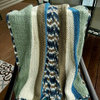Gluten free = high calories?
bossyvossy
8 years ago
Featured Answer
Sort by:Oldest
Comments (54)
Related Discussions
Gluten free
Comments (40)Interesting reading, all of this. I think as long as people approaching middle age and beyond look for a diet regimen that can essentially reverse the aging process--- more energy, fewer to no health problems--- preventing any new illnesses and reversing the lifetime effects of what they've eaten up to that point, there will be studies, books, and food products to satisfy the market. Today's wonder diet or food is usually tomorrow's carcinogen. But alternative (this free, that free) and organic---- if a universal standard is ever adopted--- markets are the fastest sectors of the food industry, so at the least all this specialization is growing the economy :-) Don't you wonder, though, if this will be the next human rights issue.....if the affluent are sure that certain foodstuffs are dangerous long term to human health, how can we allow the poor to consume them with no protections?...See MoreGluten free, nut free cake
Comments (10)I have made this white cake for years.....but not FOR years if you get what I mean....what I mean was that it was an old favorite when I baked birthday cakes more often. ICE CREAM CAKE 2 cups sugar 3/4 cup butter 2 cups sifted flour 3 tsp. baking powder 1 cup sifted cornstarch 1 cup milk 1 tsp. almond or vanilla extract 5 stiffly beaten egg whites Cream sugar and butter together. Sift the flour, baking powder and cornstarch together. Alternate adding these to creamed mixture along with milk. Beat until very smooth. Add vanilla and then fold in egg whites that have been beaten until stiff. Bake in 2 greased and floured 8" round cake pans for 25 to 30 minutes in a 350 degree oven. Frost with Boiled White Icing. Or....since he specifically asked for "vanilla cake, I might fill with a vanilla pastry cream and then top with that frosting where you mix egg whites, sugar and syrup in a double boiler and cook beating all the while until it's thick and holds it's shape Here's what I have for a flourless chocolate cake.....came from this forum many years ago... It is kind of like a cake textured hot fudge sauce served in slices. VERY rich - so cut in thin slices. Killer Chocolate Torte 2 cups unsalted butter (4 sticks) cut into 1/2 in. pieces 1 Cup plus 2 tablespoons sugar 1 Cup plus 2 tablespoons espresso powder 16 ounces bittersweet chocolate, chopped (NOT unsweetened or semisweet) 6 large eggs at room temperature 6 large egg yolks at room temperature powdered sugar for garnish whipped cream (optional) Position rack in the middle of the oven and preheat to 325 degrees. Generously butter an 8-inch springform pan with 2 3/4 inch sides. cut parchment or wax paper to fit sides, and, and a circular piece to fit in the bottom of the greased pan. Smooth paper against inner surfaces. Melt 2 cups butter with the sugar and espresso powder in a heavy saucepan over medium low heat, stirring until the sugar dissolves. Add chocolate and stir until mixture is smooth and chocolate is melted. Remove from heat and cool slightly. Whisk the eggs and additional yolks in a large bowl until frothy. CAREFULLY fold into the chocolate mixture. Pour batter into prepared pan and place on a heavy baking sheet. Bake in the preheated 325 degree oven until the edges puff and crack slightly but the center is not quite set. Transfer to a rack and let cool. Cover with foil and refrigerate overnight. to remove from pan, dip a sharp thin knife in hot water and run it around the sides of the pan to loosen the torte. Carefully release and remove the pan sides and the parchment. It will have cracks in it, but this is normal. Sprinkle lightly with powdered sugar (if desired) and cut into very thin slices with a sharp knife dipped into hot water, taking care to wipe the knife after each cut. Serve with whipped cream if desired. Many servings....See MoreWho here is gluten free?
Comments (15)Another vote for Udi's bread. It looks and tastes like the real thing. Who knew heaven could be found in a grilled cheese sandwich? LOL I tried Redbridge beer and hated it. My reaction was "ugh, why bother?" but you need to know that I love dark, rich beers. Give me a Black Butte Porter or one of my hubby's homemade chocolate porters (made with real chocolate, yummm) any day. Redbridge reminded me of lite beer. Not even close for me. I have 5 beers left of the 6-pack I tried so I'll give it a go in a recipe and hope for the best. I guess it's a good thing that I'm more a fan of wine than beer. My restaurant experience has been hit and miss with no rhyme or reason regarding my success getting GF meals. The worker at Chipotle Grill put down a fresh paper wrapper on the counter before making my corn tacos. He did it without my asking, which was simply amazing to me. My catered meal courtesy of Wolfgang Puck's in Dallas included green beans laced with soy sauce. The staff had been alerted to my GF status, I also talked to my waitress before the meal was brought to me and yet, I still received a non-GF meal. The staff apparently were clueless that soy sauce contains wheat. D'uh. Thankfully, I hadn't eaten much of the meal before I realized this screw-up and my reaction was mild (I am GF intolerant, not celiac) but several of my fellow GF-diners became quite ill. Oh, yeah, we voiced our grievance with the manager. Stupid, stupid mistake. I had the most trouble while attending a symposium in September (the banquet meal was part of the same symposium). There is a basic misunderstanding of what GF means, add in language barriers and oh, wow, the fun starts. The servers at breakfast tried multiple times to bring me French toast or crepes - the vegetarian meal - instead of my GF meal. For 2 of the 3 mornings, they served me scrambled eggs and bacon. The last morning, they served me 3 slices of bacon and steamed broccoli! Oh, yum, I love me some bacon and broccoli in the morning. Why? Turns out someone finally realized that the egg mixture they use contains flour (to thicken it). My server took pity on me and brought me 2 fried eggs. At least I finally had the answer for why my stomach had been so upset. Our organization's rep told me that caterers don't need to fulfill food allergy requests. They only need to meet ADA requirements. I'm not sure if this is correct information (it astounds me that they would not want to meet food allergy requests, wouldn't that be a liability issue?) but the lesson I took away is to always, always, always carry GF snacks wherever I go, to request a fridge for my room (cost might be waived for us GF sufferers) and to question everything multiple times. Oh, and never, never, never eat scrambled eggs at a convention again. The hardest thing for me has been discovering the hidden sources of gluten. I was crushed the day I realized that red licorice has wheat in it. :-(...See MoreGluten free = high calories?
Comments (2)Hmmmm how did this duplicate happen?...See Morebossyvossy
8 years agolast modified: 8 years agocolleenoz
8 years agowildchild2x2
8 years agobossyvossy
8 years agolast modified: 8 years agobossyvossy
8 years agolast modified: 8 years agorgreen48
8 years agoPeter (6b SE NY)
8 years agorgreen48
8 years agolast modified: 8 years agocolleenoz
8 years agoCookie8
8 years agoblfenton
8 years agoCookie8
8 years agograinlady_ks
8 years agolast modified: 8 years agoPeter (6b SE NY)
8 years agolast modified: 8 years agoblfenton
8 years agorgreen48
8 years agolast modified: 8 years agoplllog
8 years agowildchild2x2
8 years agoTexas_Gem
8 years agowildchild2x2
8 years agoPeter (6b SE NY)
8 years agolast modified: 8 years agobossyvossy
8 years agoblfenton
8 years agoElmer J Fudd
8 years agolast modified: 8 years agoCookie8
8 years agoPeter (6b SE NY)
8 years agolast modified: 8 years agoCookie8
8 years agoplllog
8 years agoblfenton
8 years agoplllog
8 years agorgreen48
8 years agoplllog
8 years agorgreen48
8 years agobossyvossy
8 years agoplllog
8 years agobossyvossy
8 years agoUser
8 years agoCookie8
8 years agobossyvossy
8 years ago
Related Stories

HEALTHY HOMESleep Happier and Healthier in a Toxin-Free Bedroom
Light pollution, toxic bedding, wallpaper that off-gases ... if you're not getting good sleep, these bedroom blights might be to blame
Full Story
FEEL-GOOD HOMESimple Pleasures: 10 Ideas for a Buy-Less Month
Save money without feeling pinched by taking advantage of free resources and your own ingenuity
Full Story
LIFE8 Home Projects Perfect for Holiday Downtime
Start the new year on the right foot by using some free time now to organize, store and clean
Full Story
HOME TECHTo Feed and Protect: Care for Your Pet From Afar With New Devices
You might miss the nuzzles, but your dog or cat won't miss food, water or monitoring with these high-tech feeders and cameras
Full Story
EVENTSMaker Faire: The Future Is Now
Kid-friendly robots and high-tech sprinkling systems: This fair shows what’s new and next
Full Story
DECLUTTERINGSmall Steps for Keeping Your Housekeeping Resolutions
Take a different approach this year, making simple, positive changes that add up before you know it
Full Story
HEALTHY HOME18 Ways to Allergy-Proof Your Home
If you're itching to reduce allergy symptoms, this mini guide to reducing allergens around the house can help
Full Story
HOUSEKEEPING7-Day Plan: Get a Spotless, Beautifully Organized Living Room
A task a day sends messes away. Take a week to get your living room in shape
Full Story
LIFE10 Ways to Boost Creativity by Doing Less
You heard right. Sometimes the best way to refill your creative well is by taking a step back
Full Story





Texas_Gem